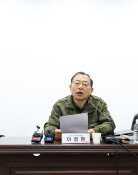[Editorial] Japan`s Historic Power Transition
[Editorial] Japan`s Historic Power Transition
Posted August. 31, 2009 07:33,
The landslide victory of the Democratic Party of Japan in yesterdays general elections has ended the 54-year reign of the Liberal Democratic Party. The elections, which enabled the first major transition of power in post-World War II Japan, hold great significance in Japanese political history. Though a non-Liberal Democratic coalition took power for 10 months after the 1993 general elections, the Liberal Democratic Party still held control.
The Democratic Partys victory resulted from the Japanese peoples desire for change. The Japanese public had been long fed up with the near total domination of the Liberal Democrats, who lost support due to bureaucratic politics, corruption, chronic factionalism and frequent replacement of prime ministers. Another factor was that the Japanese economy, which had been revived under Prime Minister Junichiro Koizumi after the lost decade, took another turn for the worse due to the global economic crisis. Led by Yukio Hatoyama, the Democratic Party lambasted collusion between the government and the Liberal Democrats and achieved a revolutionary transition of power by promising down-to-earth policies such as childcare support and ending budget waste.
Hatoyama, who will be Japans next prime minister, has stressed the importance of Asia-focused diplomacy, especially Korea-Japan relations. He publicly announced his opposition to visiting the Yasukuni Shrine, where Class A war criminals are honored. Hatoyama also says he will follow the Murayama Danwa, an official statement made by Prime Minister Tomiichi Murayama in 1995 to apologize for Japans invasion and colonial rule of Asian countries. Hatoyamas first foreign visit in May was to Korea after his election as party leader.
Bilateral relations substantially improved after President Lee Myung-bak took power early last year. Both public and private cooperation are needed to achieve a more mature partnership after the Democratic Party takes over the Japanese government. Nevertheless, it is premature to hold hasty hopes since factors that could worsen relations persist, such as the territorial dispute over the Dokdo islets. The Hatoyama-led government must make great efforts to prevent an action that could hurt Korean sentiment and deteriorate bilateral relations.
The Democratic Party favors the idea of free trade agreements with Korea and the United States. Both Korea and Japan have groups backing such an agreement and those urging extreme caution. If Tokyo cooperates with Seoul in reducing Koreas chronic trade imbalance with Japan, it will help resume free trade talks between both sides.
On North Korea, the Democratic Party of Japan rejects the North as a nuclear power in the same manner as South Korea and the United States. The cooperation of the international community including South Korea, Japan and the United States is crucial in maintaining such a principle after Japans transition of power. The Democratic Party has also pledged to do everything it can with government resources to resolve the Norths past abductions of Japanese nationals.
On domestic policy, the party introduced measures to support childcare, make public high school education free, accelerate decentralization, prohibit political appointments of public officials, and pursue eco-friendly economic development. While some expressed hope for the introduction of a new economic growth model, others have criticized the partys pledges as pork barrel measures that fail to consider economic resources. It also remains to see how the Japanese economy, which experienced rapid growth after the Second World War with the Liberal Democratic Party model, will fare under the Democratic Party.
Korea and Japan must still rectify remnants of their unfortunate history, but are indispensable to each other given their geographical proximity and shared respect for a free democracy and market economy. Japans historic transition of power should serve as an opportunity to upgrade bilateral relations.







